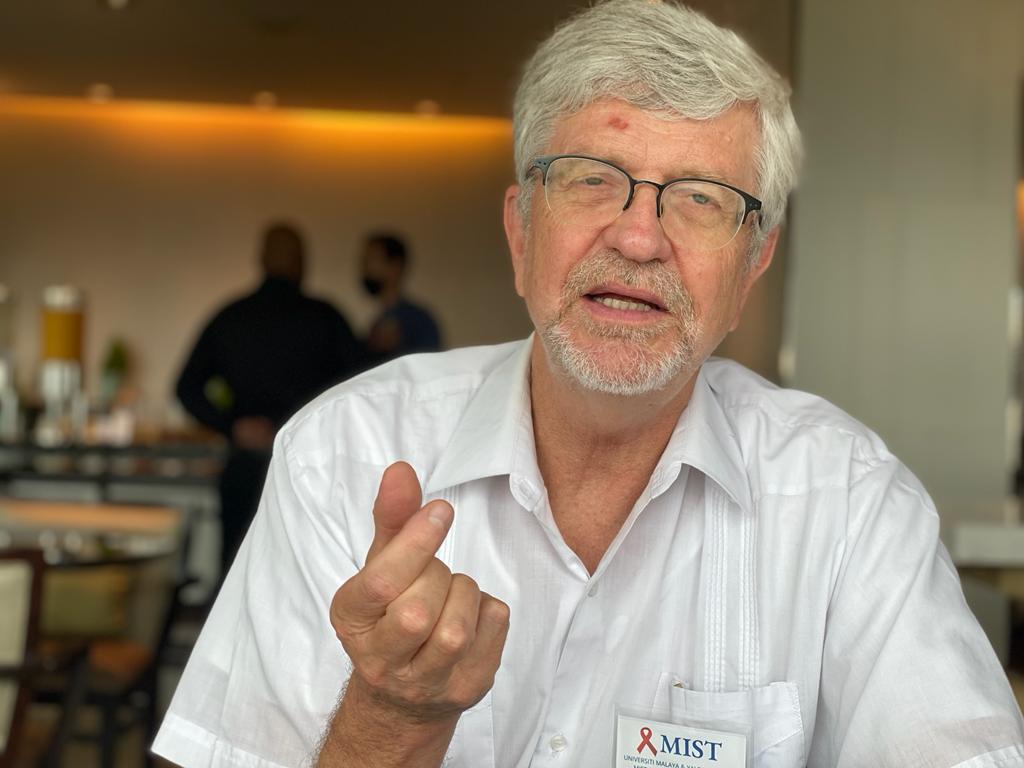KUALA LUMPUR, July 12 – The global threat from Covid-19 is still not over, an infectious disease epidemiologist from Yale University said, as infections rise and vaccines still haven’t been widely deployed across the world.
Prof Dr Sten H. Vermund, who is a dean at the Yale School of Public Health in the United States, believes that the World Health Organization (WHO) will only lift its public health emergency of international concern (PHEIC) designation – the highest pandemic alert level – from Covid-19 when cases fall substantially.
According to WHO’s dashboard, Covid-19 cases are currently increasing in every world region except Africa.
WHO director-general Tedros Adhanom Ghebreyesus told a briefing last June 29 that Covid-19 cases were on the rise in about 110 countries, driven by the BA.4 and BA.5 Omicron variants, amounting to an overall 20 per cent increase.
“With these emerging variants, every time we think we’re making progress, the next thing you know, another variant comes along and we have a surge.
“So I think WHO is reluctant to remove the designation of the emergency declaration as cases are rising,” Dr Vermund told CodeBlue in a recent interview here.
He said WHO would probably remove the PHEIC declaration from Covid-19 when vaccines are deployed more widely, when case numbers start falling significantly, and when death rates drop to “modest” levels so that the coronavirus joins the family of other respiratory viruses that do not cause disproportionate disease and death.
“That will be my guess – they’ll wait until they see the novel coronavirus having similar risk to the population of other common respiratory viruses.”
United Nations news agency UN News noted that WHO’s mid-year deadline for all countries to vaccinate at least 70 per cent of their populations will not likely be met, as the average rate in low-income countries stands at 13 per cent.
Dr Vermund pointed out that although vaccination rates in Africa are low due to poor access to the jabs, Covid-19 does not appear to be as common or devastating in the continent.
Vaccine hesitancy is also a problem in various countries. The American infectious disease expert noted that about 15 per cent of adults in the United States refused Covid-19 vaccination, while 30 per cent of parents do not want to inoculate their children against the coronavirus.
However, he stressed that variants could emerge with ongoing transmission and hence, it is in the global interest to minimise coronavirus circulation and to reduce the likelihood of emerging strains by expanding vaccine coverage.
“So I do think we are a ways away from a Covid-free world, not absolutely free, but say Covid death-free world, we’re a ways away because we aren’t deploying vaccines as widely as we should.”
In Malaysia, about 68.5 per cent of adults aged 18 and above have received their booster or third jab, while about four in 10 children aged five to 11 years have received two doses.
Health Minister Khairy Jamaluddin projected Covid-19 infections to peak in three months during Malaysia’s current new wave, but said disease caused by the BA.5 variant was not likely to be more severe than infections during the initial Omicron wave.
New Pandemic Virus Expected Every Eight Years

Dr Vermund said health ministries across the world should have pandemic preparedness and response plans to prepare for the next inevitable pandemic.
He observed that influenza pandemics are now emerging every decade after a long gap between 1919 and 1957.
Two influenza pandemics occurred in 1957 and 1968, while coronavirus pandemics have broken out twice in less than 20 years: SARS in 2003-2004 and Covid-19 in 2020. MERS, with outbreaks mostly reported in the Arabian peninsula, emerged in 2012 and was also caused by a coronavirus.
“One can see a pandemic virus emerging every eight years or so,” Dr Vermund said.
“This is not unreasonable. When you look at pandemic influenza and pandemic coronavirus, just those two examples over the last 30 years, you see multiple outbreaks.”
He noted that Covid-19 was much more severe compared to previous outbreaks, with more than half a billion confirmed cases globally, including 6.3 million deaths, reported to the WHO.
“Flu has that potential. And in theory, other viruses have that potential.”
Dr Vermund pointed out that the US’ Centers for Disease Control and Prevention (CDC) previously updated its pandemic influenza reports back in 2007 and had talked about the need for a rapid pandemic response, stockpiling personal protective equipment (PPE), and protecting vulnerable populations.
“This Covid-19 should not have been a surprise. It’s been predicted that we would have pandemic threats and we needed better preparedness,” he said.
The WHO, he pointed out, had also sounded the alarm for pandemic preparedness before Covid-19 hit.
“I think we’ve been in a little of a deep sleep because we have many, many publications about pandemic preparedness, but yet, many of these were ignored by policymakers.”
He questioned the lack of plans to protect the elderly in assisted living facilities and nursing homes, pointing out that most infectious diseases are more severe in senior citizens and very young children. Covid-19, however, is a paradoxical disease that attacked the elderly, but mostly spared kids.
Dr Vermund highlighted exceedingly high Covid-19 mortality in nursing homes in the United States, noting that there were employees working in multiple nursing homes and health care professionals visiting various such facilities that likely spread the virus from one nursing home to another.
“These are issues that should be predictable and we should be able to have a pandemic plan for nursing homes, so when an infectious agent is emerging, we have a provision to restrict the employees – perhaps pay them extra – so that they just work in one place. They sleep overnight there, until the pandemic passes, or until the risk subsides.”
The American infectious disease epidemiologist called for a wider systems level response involving other ministries to help implement pandemic preparedness plans by health agencies, such as extra financial resources from the Finance Ministry and the Home Affairs Ministry to protect vulnerable populations like prisoners who live in crowded settings and are more vulnerable to pandemic spread.
“Pandemic preparedness and response should be a part of every Ministry of Health’s plan and capacity. If we don’t do better the next time around, we only have ourselves to blame because Covid-19 was a tremendous learning experience.”
Continue Funding And Research Into Vaccines And Infectious Disease

Dr Vermund called for continued funding and research into vaccines and infectious disease in between pandemic periods.
He pointed out that a “very promising” vaccine for the Ebola virus was developed when an outbreak occurred in Congo a few decades ago, but it was not fully developed or tested after the epidemic died down.
Then, the largest Ebola outbreak in history happened in 2014, killing 11,000 people across three countries in West Africa.
“If we had developed that vaccine and shown it to be immunogenic and safe, we could have deployed it in a real-world setting and gained insight as to its efficacy. Instead, we had to spend many months in the lab and at the bedside, running clinical studies that could have been run previously.
“That is an example of not appreciating the value of developing the product.”
Similarly, SARS vaccines were developed in 2004 to 2005, but were left untested after the global outbreak ended. Then, the MERS epidemic broke out in the Middle East in 2012 and the global Covid-19 pandemic in 2020.
“If we had developed SARS vaccine, we might have been able to tweak the existing vaccine to make it applicable for SARS-CoV-2 or MERS in the Middle East, rather than start all over again,” Dr Vermund said.
“If you had gone to the trouble of developing it, find out if it’s immunogenic, find out if it’s safe, then you’re prepared to have a tested concept – that we have a safe and immunogenic vaccine against the coronavirus.
“And as new coronaviruses emerge, we’re in a position to modify the construct of the previously developed vaccine and have a product that’s more immediately available.”
Dr Vermund also noted that the Regional Emerging Diseases Intervention (REDI) Centre located in Singapore, which was funded by the Singaporean government with support from the United States, lost funding several years ago after receiving funding for about a decade.
“This sort of transient commitment to an entity like that is disturbing,” he said.
“This can’t be, ‘well, we had another pandemic the last five years, so we have to stop the research’. We should be doing the research so that we’re completely and utterly prepared when these pandemics emerge, and possibly we can even prevent them from emerging.”
The public health professor at Yale suggested increased surveillance in animals and animal vaccination to prevent zoonotic diseases from infecting humans, instead of the cruder current approach of culling that could devastate industries.
Denmark and the Netherlands culled millions of mink in 2020 after a mutated version of the SARS-CoV-2 virus, which causes Covid-19, was detected among mink on fur-farms in Denmark.
“Perhaps there’s a way we can judge virulence and transmissibility in experimental models, or in small animal models, and make judgments about emerging variants,” Dr Vermund said.
“This is what we do research in infectious disease, epidemiology, virology, and other veterinary sciences. If we have the ability to provide surveillance and experimental support and public health support, we may be able to guide the global response, and in a more efficient way.
“Killing millions of animals is not strictly efficient. Locking down society so that people don’t go to grocery stores, work, or school is not strictly efficient. We may be able to do better than that if we have more insights.”








